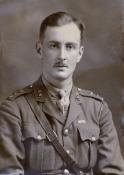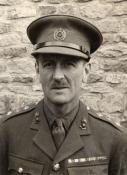
War Memorial
| Lieutenant Colonel Miles Belfrage REID MC KM | |
|
Signal Company, Royal Engineers Date of birth: 5th May 1896 Date of death: 6th October 1984 Died aged 88 Buried at St James' Church, Heyshott |

|
| Miles Belfrage Reid was born at Cotmandene Lodge, Dene Street, Dorking in Surrey on the 5th of May 1896 the fourth son of Russell Belfrage Reid, a retired tea planter, and Margaret Laura (nee Willett) Reid of 30 Dene Street, Dorking in Surrey. He was christened at St Martin's Church, Dorking on the 14th of June 1896. He was educated at Hazelwood until April 1906 before going on to a larger Preparatory School with his brother Graham. He went on to the Royal Naval College Osborne where he studied for two years before attending the Royal Naval College Dartmouth from January 1911 to December 1912 where he was a member of the Rugby XV in 1911. In his third term at Dartmouth, in 1912, he received the King's Medal from Admiral the Hon Sir Heworth Meux in a ceremony which took place on the quarter deck before all the officers and cadets. "For gentlemanly bearing and good influence among comrades during his period of service at the College". While he was at Dartmouth he acted as mentor to Prince Albert (later George VI), beginning a friendship which would last until the King's death. He visited Germany during 1912 as his father thought he should learn German. While he was there he watched the turning out of the guard at the Kaiser's Palace and was much impressed by their precision. He won the Chief Cadets Captain's Award which takes the form of a ceremonial dirk. The dirk was engraved with his name, the date and "RN College Dartmouth and HMS Cumberland." He was appointed as a Midshipman in the Royal Navy on the 15th of September 1913 but he left the service due to seasickness. He matriculated for Pembroke College Cambridge in 1914 but didn't take his place due to the outbreak of war. Instead, in 1914, he took the examination for commissions into the Royal Engineers passing out 9th in training at Aldershot and was commissioned as a 2nd Lieutenant in the Royal Engineers on the 5th of September 1914. He landed at Gallipoli on the 22nd of July 1915 but was wounded and invalided home and was then posted to the Signal Depot at Dunstable. He was awarded the Military Cross for operations during the Battle of the Somme which was announced in the London Gazette of the 16th of November 1916 and the citation read:- "For conspicuous gallantry during operations. He directed the work of linesmen under heavy shell fire, and by his energy and fine example, maintained communications during a critical period." He was mentioned in Field Marshall Haig's despatches of the 7th of April 1918 "for gallant and distinguished service in the field." He was promoted to Acting Lieutenant Colonel and was reputedly the youngest Lieutenant Colonel in the British Army. He was married to Frances Winnifred (nee Hill) on February the 9th 1918 at the Sackville College Chapel, East Grinstead and they had two sons, John Willett, born on the 13th of November 1918, and David Benedict Russell, born on the 31st of October 1920. They lived at Hoyle Farm, Heyshott near Midhurst in Sussex. In early 1920 he went to Alexandria in Egypt to work for the engineering firm of Messrs Mather and Platt of Manchester but left them in 1925 becoming involved with a fledgling company called Colas that made a bitumen product which was used in building Germany�s autobahns. When World War Two broke out, although he was over age, he was commissioned as Lieutenant 119433 on the General List on the 17th of February 1940. He used his influence to pull some strings and was made part of "Phantom", a group of multilingual officers who acted as liaison between generals of the French and British armies. From the 11th to the 27th of May 1940 Miles Reid acted as Liaison Officer between Lord Gort at British GHQ, and the First French Army. He escaped at Dunkirk and was promoted to Captain on the 27th of September 1940 and to temporary Major on the same date. He was then sent to Greece to do a similar liaison job. He and his men were captured by German paratroops in April 1941, after running out of ammunition, while attempting to defend the bridge over the Corinth Canal. He was imprisoned at Oflag VB at Koenigstein in June 1941 and in Tittmoning from June to October 1941. He was then moved to Oflag VIB at Warburg where he escaped with colleague, Michael Smiley, by hiding in bundles of laundry but they were both recaptured the same day. On his recapture it became worryingly apparent that the Nazis had decided that his work in Germany during the 1930s was part of a spying mission on behalf of MI5. However, in August 1942 he was moved to Rotenburg until the September when he was sent to Spanenberg until September 1943. He was then moved to Colditz on the grounds that he was �Deutschfeindlich�. He was the oldest British prisoner in Colditz and faked heart disease while he was there by smoking heavily and drinking large amounts of black coffee; he was repatriated to the UK in December 1944 on "health grounds", finally arriving back in England early in 1945. His family have a letter to him from the King dated the 7th of February 1945 asking him if he would "mind awfully popping in" to see him at Buckingham Palace if he had time. On the 29th of November 1945 he was awarded the Order of the British Empire (Military Division) for his service in Greece. The citation for his award read: - "In 1941, from the beginning of the British Army occupation of Greece until his capture on or about 27th April, Major Miles Reid was in command of the GHQ Liaison Squadron operating directly under HQ British Forces in Greece. One of the characteristics of the fighting retreat carried out in the face of every conceivable difficulty during a period of three weeks was the almost insuperable difficulty of getting information of what was happening at the front. This is typical of any retreat but particularly so of the operations in Greece, where it was largely due to the conduct and the high standard of training in the GHQ Liaison Squadron during that period that the Commander-in- Chief was made aware of the constant changes which took place during the retreat, and that a picture of the situation was presented to him in a manner which enabled him to keep ahead of the various enemy moves. That this was so was almost entirely due to the foresight, energy and leadership of Major Reid, who never at any time spared himself, who was constantly at the front with his detachments, and who was eventually captured for that very reason. It is not possible to speak too highly of his conduct during this trying period though, in company with many others at such a time, it was probably less spectacular that it would have been in the closing stages of a highly successful campaign." He left the army with the rank of Honorary Lieutenant Colonel. On the 14th of April 1956 he was appointed as Deputy Lieutenant of the County of Sussex; he was also a Justice of the Peace and lived at River House, Petworth in Sussex. He continued to work in industry after the war and was with Mobil from 1951 to 1960, possibly as a director. Very sadly, his wife died of cancer on the 4th of February 1954; he never remarried. He was the author of three books:- "Age Cannot Wither" (Hutchinson, undated but 1944 or 1945) which was a novel written while he was a POW in Spanenberg. "Last on the List" ( Leo Cooper, 1974) deals with his part in Phantom from early days in France up to his capture in Greece. It was also largely written whilst he was a prisoner. "Into Colditz" (Michael Russell, 1983) Follows the story on from his capture in Greece to his return home from Colditz. |
|
 | |
| Went on to Royal Naval College |
Back